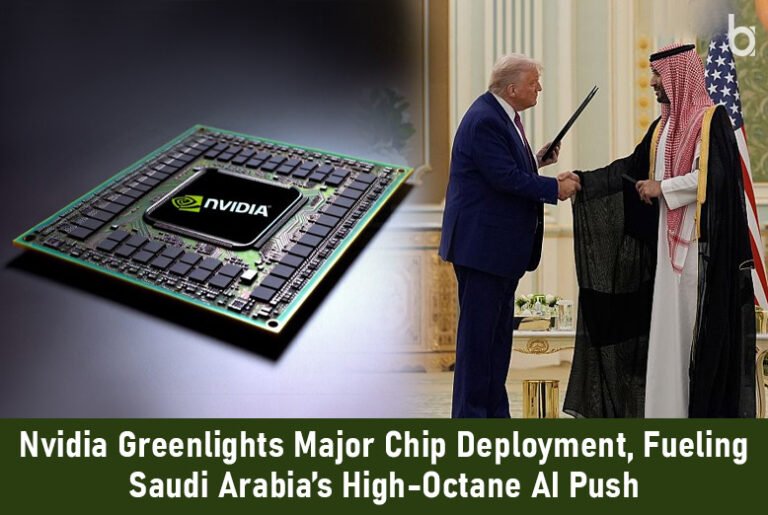Business APAC
May 14, 2025
Powering the “AI Factory”
The Kingdom of Saudi Arabia’s ambitious drive to etch its name among global artificial intelligence leaders just received a significant shot of silicon. US chip titan Nvidia confirmed on Tuesday, May 13, 2025, that it’s channeling an initial 18,000 of its most sophisticated AI processors to Humain, a freshly minted AI enterprise with the hefty backing of the nation’s Public Investment Fund (PIF). This pivotal agreement, announced amidst a high-level American delegation’s visit to the Saudi capital, is all about laying down a powerful, foundational AI infrastructure, seen as crucial to realizing the Kingdom’s sweeping Vision 2030 and energizing its rapidly expanding tech landscape.
Under the terms of this closely watched deal, Nvidia will be shipping its formidable GB300 Blackwell chips – processors sitting at the apex of current AI computing power – directly to Humain. These aren’t just any chips; they’re earmarked to be the computational heart of a massive new 500-megawatt data center project, a facility many in the industry are already dubbing an “AI factory.” And this is just the beginning. This first shipment kicks off a broader five-year strategy that anticipates Humain harnessing “several hundred thousand” Nvidia GPUs, a move designed to cement its standing in the fiercely competitive and fast-morphing world of artificial intelligence.
Nvidia’s chief, Jensen Huang, fully grasped the significance of this collaboration. Speaking at the Saudi-US Investment Forum in Riyadh, he drew a compelling parallel: “AI, like electricity and internet, is an essential infrastructure for every nation.” Huang added, “Together with Humain, we are building AI infrastructure for the people and companies of Saudi Arabia to realize the bold vision of the Kingdom.”
A Cornerstone of Vision 2030
For Saudi Arabia, this massive injection of high-octane computing capability is more than just a tech upgrade; it’s a cornerstone of its grand plan to pivot its economy beyond oil and emerge as a frontrunner in the industries of tomorrow. Cultivating sovereign AI capabilities, underpinned by truly world-class AI infrastructure, is viewed as the master key to unlocking a wave of innovation across a spectrum of sectors – from the traditional strongholds of energy and finance to the burgeoning fields of advanced healthcare and the development of futuristic smart cities. The Kingdom hasn’t been shy about its aspirations, making it clear it intends not merely to consume AI technology, but to be a significant architect of its global evolution.
Nvidia, already a titan in the AI semiconductor space, further burnishes its credentials as the go-to partner for nations serious about constructing their own formidable AI infrastructure. This Saudi deal also lands in a week buzzing with other major tech announcements from US giants like AMD, Qualcomm, Google, and Oracle, all signaling a deeper dive into the Middle East’s rapidly expanding digital frontier. It’s a collective surge that points to an intensifying regional race to build out leading-edge AI infrastructure.
The sheer scale of the Saudi project speaks volumes. A 500-megawatt data center, humming with the power of hundreds of thousands of specialized AI chips, signifies a quantum leap in computing resources for the region. This will do more than just enable the training of incredibly complex large language models and other sophisticated AI systems; it’s also expected to act as a magnet for top-tier talent and trigger a fresh cascade of investment into the Kingdom.
Conclusion with future outlook or implications
This watershed agreement between Nvidia and Humain transcends a simple hardware sale. It’s an unambiguous declaration of Saudi Arabia’s technological ambitions and its vision for the future. By committing vast resources to cutting-edge AI infrastructure, the Kingdom is making a strategic bet on becoming an indispensable node in the global AI network.
The coming years will likely see a dramatic increase in AI development and real-world application across Saudi Arabia, potentially redrawing its economic map and creating entirely new paths to prosperity. As the world’s hunger for AI processing power continues its exponential climb, nations equipped with robust, self-reliant AI capabilities will undeniably wield significant strategic clout, and Nvidia looks set to continue its role as a key architect of that future.
Also Read: RBI Cracks Down: Digital Loan Apps Now Need Official Registration



